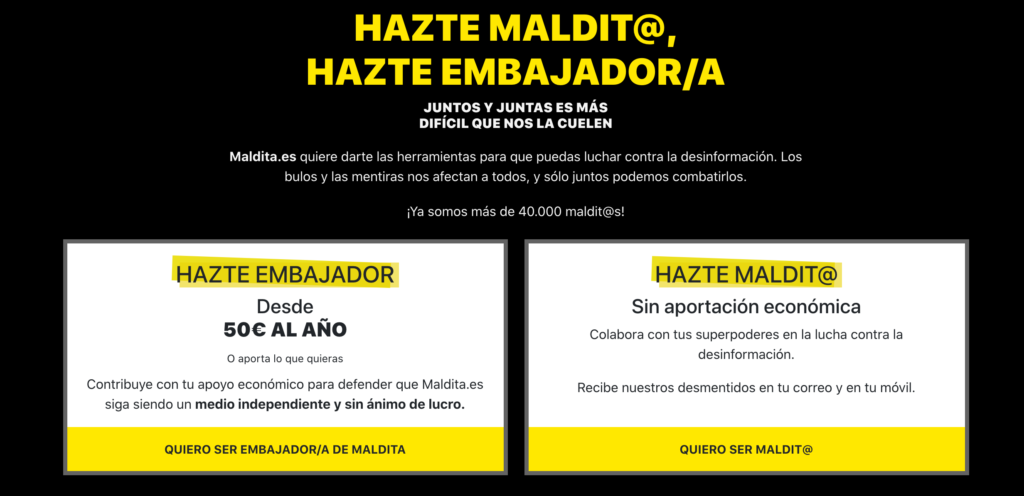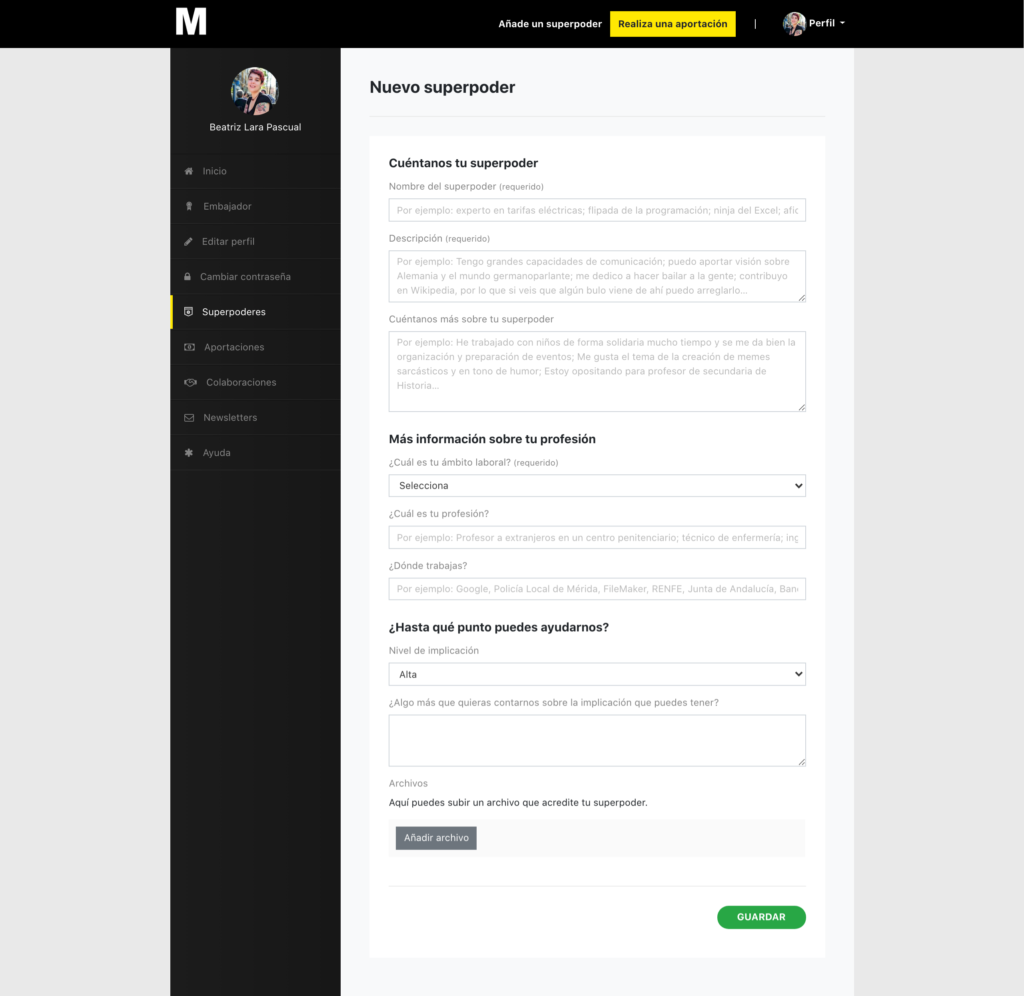Newsroom overview
A Spanish fact-checking platform focused on combating the spread of disinformation
Madrid, Spain
2018
2019
3,030,874
42,925 total members, including non-paying ones; about 1,000 paying members
Spanish broadcast journalists Clara Jiménez Cruz and Julio Montes launched Maldita.es (Maldita translates to “The Damned”) as an independent organization in 2018, four years after they began experimenting with fact-checking as a side project called Maldita Hermeroteca. Most of the claims they spend their time debunking come from tips from community members.
In 2018, they sent out a survey to community members to learn what they thought about Maldita. It included questions about what skills they could contribute to Maldita. The enthusiastic response (2,645 answers within four days, according to a European Journalism Centre profile) prompted them to make harnessing these skills a central part of their strategy going forward. Maldita branded members’ expertise as “superpowers” and created a database to make it easier to tap those superpowers going forward.
Why this is important
Organizations succeed at membership when they find the intersection point between their needs and potential members’ motivation to participate and contribute. For Maldita, those needs are financial support and expertise to help expand the scope and speed of its fact-checking operations. Maldita gives members, aka Malditos, an opportunity to contribute one or both, and have worked to make the two opportunities clear and easy to understand, while also safeguarding the integrity of their journalism.
With its “superpowers” database, Maldita is also one of the few organizations the research team studied who has recognized a contribution other than money as a pathway to membership.
What they did
Maldita launched their membership program, inviting community members to “become one of the damned,” in June 2019. They began asking Malditos to consider adding themselves to the superpower database at the same time.
Today, there are three types of Maldita members, all of them called Malditos (see landing page for more detail):
- General Malditos: Anyone who has signed up for one of Maldita’s newsletters (about 40,000 people in July 2020)
- Ambassadors: Any of the 40,000 Malditos who is also a financial supporter of Maldita (about 1,000 ambassadors in July 2020)
- Malditos who contribute superpowers: Any of the 40,000 Malditos who registered their expertise (aka “superpower”) to support Maldita’s fact-checking efforts (about 2,000 active accounts in July 2020)

They recruit superpower Malditos with calls to action in their newsletters and on their website. When they publish a fact check in collaboration with a Maldito, they acknowledge them in the post-article footer and invite other people to add their own expertise to the database.

English translation:

There are three steps to joining the superpower community: registering on Maldita’s platform, providing details about their expertise, and getting verified. The expertise form includes a place for Malditos to upload proof of their credentials – a LinkedIn profile, for example, or a copy of a diploma or research paper if they are an academic.
When designing the expertise form, Maldita struggled to figure out the right balance between pre-filled categories and open-ended fields. Pre-filled categories can’t capture every aspect of someone’s knowledge, but completely open answers were difficult to make searchable. They ultimately decided to use open fields in the form. After it’s submitted, community manager Bea Lara reads the replies and adds appropriate categorical tags for future use.
An example of the superpower signup page

Lara gives the example of a biologist with an expertise in virology who might also have above-average knowledge of nutrition. With a pre-filled category system, that person would likely register as a biologist and stop there. “If you don’t have an open field where people can write and write and write, you won’t get any of that nuance,” she says.
Most people add two or three sentences of description about their expertise.
“You can tell if people are interested in collaborating based on the quality of the response,” she says. “A two-word answer is not a good sign, but people who explain more, you know that these people are really interested in engaging with you.”
As the community manager, a key part of Lara’s job is helping the journalists find the right people in the superpower database. Once Lara identifies a Maldito, she’ll share that person’s information with the journalist working on the fact check, who will reach out via whatever mode the Maldito indicated.
Maldita only relies on a superpower contributor as an independent source if they’ve worked with them many times in the past. Otherwise, they’ll seek independent verification of anything a Maldita provides. Even with that backstop, working with Malditos can significantly speed up the debunking process by reducing the amount of time a journalist spends trying to narrow their inquiry.
Each Maldito in the superpower database has a credibility rating, and one of the factors that influences it over time is how often they successfully collaborate with reporters. Those with higher credibility ratings might eventually be considered as an independent source.
The results
The topics for superpower collaborations vary widely. Maldita now collaborates with superpower contributors on everything from lighthearted, viral pranks to the safety of putting a pool on an apartment balcony to coronavirus misinformation.
One of Lara’s favorite examples is a collaboration to debunk a hoax about a new strategy for car hijackings in Madrid. For years, rumors circulated about criminals throwing eggs on car windshields because the egg whites would not come off with water, blinding the driver and making it easier to hijack the car.
Their database included an expert on eggs, so Lara reached out to him for help disproving this hoax. The Maldito went out and threw eggs at her car windshield, then added water – and proved that the residue came off easily.
The superpower community that has developed around “Maldita Ciencia,” their science-focused vertical, is particularly strong. Lara estimates that they use one or two superpowers a week. One week in summer 2020, they used 10 superpowers. They’ve worked closely with this community throughout their coverage of coronavirus to debunk misinformation that masks can cause hypoxia, that the flu vaccine can cause coronavirus, and that a vaccine has been approved despite causing serious side effects.
They’ve refined the use of the credibility rating system over time to reflect not just the credibility of a person, but their accessibility as a source. Factors such as thin replies in the initial expertise form, slow or non-replies to outreach, and vague answers all contribute to lower ratings. Those with low credibility ratings can be filtered out of search results, even if the area of expertise is a match. The rating goes up when someone collaborates helpfully on an article.
As the strength of the “superpower” community has grown, Maldita has designed increasingly tailored opportunities to participate.
The superpower community includes a substantial number of educators, particularly at the university and secondary (high school) level, who are very interested in the educational side of disinformation. Maldita launched a newsletter specifically for teachers of any kind, geared toward helping them teach students how to identify and combat disinformation. They send it once a month, and it includes a mix of advice and curriculum materials.
What they learned
People need help understanding their superpowers. Teaching people to understand that they don’t need to have incredibly specialized expertise for it to be a superpower requires clear language, frequent examples, and a strong feedback loop.
“The concept of superpowers is very powerful, but for some people it’s difficult to understand,” Lara says. They think it’s something “really amazing, like being a chemical expert in proteins… “Sometimes we only need a good lawyer or someone who knows about mental health,” she says. At one point, they needed a handyman to fix their broken door – and they found a Maldito to do that, too.
Key takeaways and cautionary notes
Be clear about what it means to be a member of your organization. At Maldita, a member is anyone who receives their free newsletter. “Ambassadors” are members who also provide financial support, and superpower contributors are members who also help debunk misinformation by sharing their expertise. If there’s more than one pathway to membership, like there is at Maldita, specificity of language becomes even more important to making sure all members feel valued – particularly for making sure that those who don’t contribute money don’t feel like lesser members.
Trolls exist. The superpower database only works because Maldita has been careful to evaluate the credibility of each person who registers, and to put red flags on those accounts.
Other resources
- European Journalism Center: Why Maldita surveyed their users to find out their superpower


